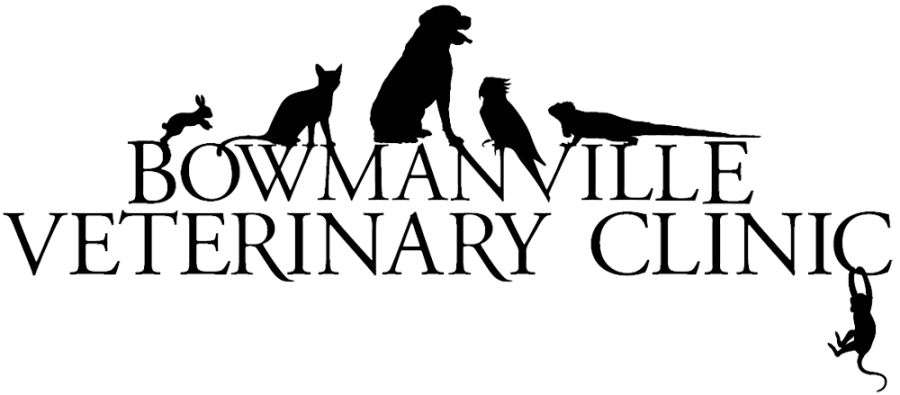Recently an article was brought to my attention regarding a vaccine protocol that was different from the one currently implemented at Bowmanville Veterinary Clinic. I thought I would take the opportunity to talk a bit about vaccines and the most common questions that are asked - which ones are offered, what life-style factors are considered when deciding which vaccines are recommended for a patient and how often they are administered. This week's topic covers dog vaccines - check back for details pertaining to our feline friends.
To start off, there are a series of "core" vaccines that every dog should have regardless of risk:
- canine adenovirus, type 2
- canine parvovirus, type 2
- canine distemper virus
- rabies virus
The first three are often given together in the form of a vaccine called DA2P. These vaccines are considered core vaccines because they can be lethal if acquired, they are highly infectious (especially distemper) or they possess a significant risk to the human population (think rabies).
All puppies require a 3-injection series of the DA2P, starting at 8 weeks of age. This is due to the presence of maternal antibodies which are picked up from their mother's milk. These antibodies are important as they provide protection during the puppy's first few months, but these antibodies can also combat the effectiveness of the vaccine series. By the time a puppy is 14-16 weeks of age, the maternal antibodies should be low enough in most puppies (98%) to allow for successful vaccination. This is why it is recommended that the final set of vaccines are given at 16 weeks of age. It is at this age that a single rabies vaccines is also administered.
The rabies vaccine is then boostered one year later, then either annually or tri-annually from there. As rabies is a vaccine that is mandated by law, care must be taken to follow local regulations. Here at Bowmanville Veterinary Clinic we recommend the 3-year rabies vaccine.
For many years it was recommended that the DA2P vaccine be given annually. However, recent talk (including 2011 Vaccine Guidelines produced by the American Animal Hospital Association) has been pushing the use of tri-annual DA2P vaccines - regardless of what the vaccine companies are putting on their labels. There is some science in this: recent studies have shown that many dogs will develop immunity to DA2P vaccines for greater than 3 years. However, many vaccine companies were not encouraged to test their vaccines for duration of immunity (ie: how long they produced immunity in a dog), unless they were making claims that differed from annual re-vaccination recommendations. This has now changed for all new vaccines being produced, but a gap still exists when using existing vaccines that still carry the yearly booster recommendations.
What does this mean for us at Bowmanville Veterinary Clinic? We are currently examining available vaccines and studying the research done on vaccines labeled with a 3-year vaccination recommendation. We are doing this cautiously, as several years ago we made the switch to 3-year DA2P vaccine and noticed a higher number of adverse reactions than usual (this finding is completely anecdotal and holds no statistically significant data, but it made us take pause). Our hope is that soon a 3-year DA2P vaccine will be available to our clients.
In addition to the above listed vaccines, there are also "non-core" vaccines available. These include:
- leptospirosis (Leptospira sp)
- lyme (Borrelia burgdorferi)
- kennel cough (Bordetella bronchiseptica)
These vaccines are recommended based on life-styles and risk of infection. Risk factors for kennel cough include activities that promote dog-to-dog exposure (including trips to the groomers, trips to the dog park, obedience classes, show circuits, sporting trials and doggy-daycare). The main risk factor for leptospirosis and lyme is wildlife exposure (leptospirosis is transmitted through contaminated wildlife urine, while lyme is a tick-borne disease). One must also consider the area of which their dog lives and whether those disease are common in that area. In Bowmanville, the risk is present; we have had had both conditions diagnosed in dogs in our area. While Bowmanville is not classified as a lyme-endemic region, many of the areas where our patients spend summer months cottaging are such regions.
Many people are concerned with the risks and adverse reactions that can occur with vaccines. It is generally agreed that veterinary vaccines have an excellent safety profile, but as with any vaccine, adverse events can occur. These include, but are not limited to, localized swelling, lethargy, inappetance, fever, facial swelling, hives, and failure to produce immunity. Adverse events are reported by veterinarians to inform vaccine companies and regulating bodies.
In an attempt to reduce the number of vaccines administered to their pets, many owners are expressing interest in titre testing. This is a blood test that measures the amount of circulating antibodies present in a dog to determine if they are in need of a booster vaccine. Some titre tests are reliable in determining immune status (like canine parvovirus and distemper) while others do not correlate well to immunity (such as leptospirosis and lyme). Rabies titre testing is well correlated to measure immunity, but as rabies is required by law in many areas (including Ontario), it is not acceptable to measure titres in lieu of vaccination, unless due to a medical condition.
Vaccines will always be a much-discussed topic, but in the end we must remember that vaccines are helpful in preventing life-threatening conditions. As always, if you have any questions regarding your dog's current vaccines and vaccine schedule, if you are interested in titre testing or you are concerned about adverse reactions, contact your veterinarian.
Vanessa Tonn, DVM



